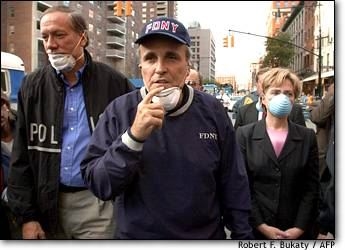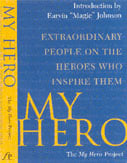 |
At 9:05 p.m. last Wednesday, Rudy Giuliani finally broke. Exactly 36 hours after he first rushed to the World Trade Center, the mayor’s neo-Churchillian reputation was already secure. He had just escaped injury or death in The Attack, calmly led a terrifying retreat uptown, then inhabited the role of wartime leader with a fine mixture of brisk compassion and gritty command presence.
 |
But now an aide caught him wolfing down half a sandwich of what she described as "oily cheese" and "meats that sweat"--a total violation of the stewed-tomato-and-fruit diet he had strictly observed as part of his treatment for prostate cancer. The mayor of New York was famished and exhausted and grieving more than the public knew.
Many of the senior uniformed officers he saw every day were dead, heroes all. His staff, still barred from reoccupying a phoneless city hall, looked like combat veterans; one executive assistant was back by the mayor’s side, though her husband lay beneath the rubble. By midnight Giuliani had slipped quietly back downtown to the ruins, where his people worked all night under the floodlights, trying to find the slightest trace of their friends and co-workers, now the nation’s casualties of war.
 |
Sept. 11 began as Primary Day to elect a new mayor of New York. It ended with the incumbent chosen by acclamation as the new mayor of America. Giuliani is restricted by term limits, and scheduled to leave office in January. But it’s clear now that his country will call him back into service in some capacity. There has been talk of making him some kind of reconstruction czar, though his skills might be better served managing the infiltration of terrorist organizations the way he once busted the Mafia. The kick-ass quality that last week had him threatening price gougers, telemarketers and bogus Web sites might, with the proper checks and balances, come in quite handy after all.
In the meantime, the task before him is immense. I’ve been down to view the wreckage twice so far, and it’s much worse than it looks on TV, a landscape out of Dante. This is something all of the politicians notice when they come through. Hillary Clinton says it dwarfs anything she has seen on her many travels to disaster sites around the world. President George W. Bush knew it was bad, but not this bad. "The scope of it surprised him, particularly from the helicopter," Giuliani told a few of us afterward. "He just looked at it, absorbed it and said: ‘Oh, my’." At the site, Bush struck exactly the right tone, connected well with the rescue crews and, for the first time all week, didn’t seem overshadowed by a lame-duck mayor.
 |
Giuliani’s mobilization of the city’s emergency services has been a marvel, but management alone wouldn’t have created such an aura had the mayor himself not been touched by fire. Late in the week I saw both places he holed up amid the onslaught. From the looks of them now, I’m sure glad I wasn’t there on Tuesday.
The first was an FDNY (Fire Department of New York) command post on West Street near the North Tower. Giuliani got a briefing on the evacuations from senior chiefs, even the most experienced of whom had no idea that the burning towers would actually collapse. But 10 minutes after the mayor left, the first tower went down. Immediately, the firefighters knew the second, closer tower would fall, too. Instead of moving backward, many, including the senior men, held their position, all but certain they would perish.
 |
From there Giuliani, needing phone lines, commandeered a Merrill Lynch back office at 75 Barclay Street. After 45 minutes someone yelled, "Get down! It’s coming down!" The force of the collapse flattened the building across the street, and a huge plume of smoke blocked the exit the mayoral party needed. Giuliani, wearing a gas mask, was led running through a smoke-filled basement maze and out the other side, where the soot they’re now calling "gray snow" was a foot deep. The doomed were jumping out of the remaining tower before the mayor’s eyes. Except for a walkie-talkie, all connection with the outside world was cut.
Stripping off the gas mask, Giuliani and a small group set off on foot for a mile hike up Church Street, urging the ghostly, ash-caked survivors to "Go north! Go north!" A distraught African-American woman approached, and the mayor touched her face, telling her, "It’s going to be OK." Farther up, a young rowdy got the mayoral "Shhhhhh!" he deserved. That set the tone. He was sensitive and tough and totally on top of everything from DNA on toothbrushes (to help identify bodies) to structural engineering. Even his press criticism was, for once, on target. And even his harshest critics offered nothing but sincere praise.
In recent years, Rudy Giuliani has been a cranky and not terribly effective mayor, too distracted by marital and health problems to work on the city’s surging murder rate. But in this cataclysm, which he rightly called "the most difficult week in the history of New York," the city and the country have found that most elusive of all democratic treasures--real leadership.
Page created on 7/19/2006 10:24:38 AM
Last edited 1/6/2017 6:17:13 PM

